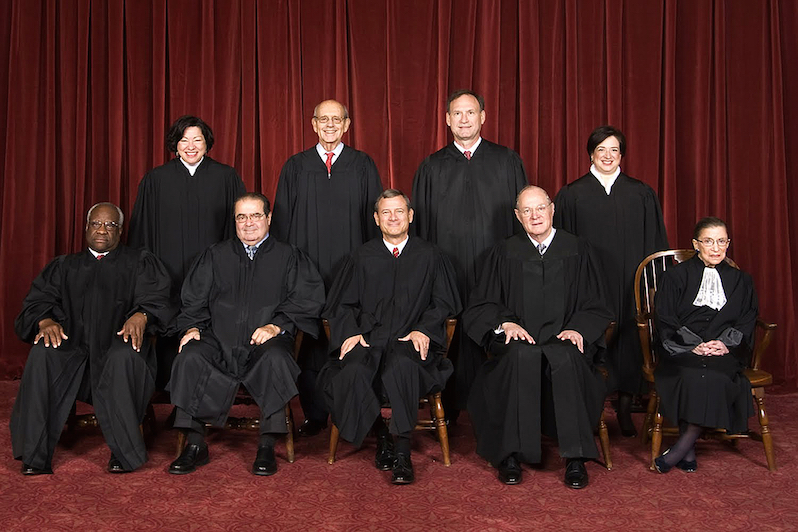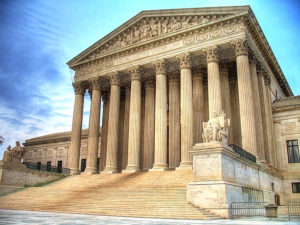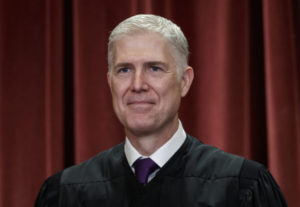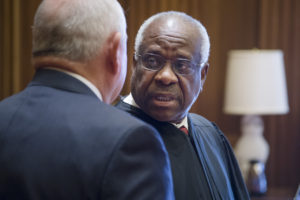Supreme Court Leans Left in the Wake of Antonin Scalia’s Death
All things considered, the Supreme Court’s just-completed term was a good one for liberals and progressives. The Roberts Court in 2010. Back row (left to right): Sonia Sotomayor, Stephen Breyer, Samuel Alito and Elena Kagan. Front row (left to right): Clarence Thomas, Antonin Scalia, Chief Justice John Roberts, Anthony Kennedy and Ruth Bader Ginsburg. (Steve Petteway / Collection of the Supreme Court)
1
2
The Roberts Court in 2010. Back row (left to right): Sonia Sotomayor, Stephen Breyer, Samuel Alito and Elena Kagan. Front row (left to right): Clarence Thomas, Antonin Scalia, Chief Justice John Roberts, Anthony Kennedy and Ruth Bader Ginsburg. (Steve Petteway / Collection of the Supreme Court)
1
2
On abortion, Justice Stephen Breyer took the honor of penning the majority 5-3 opinion in Whole Woman’s Health, released Monday. The decision struck down an omnibus Texas statue, known as HB2, that would have required abortion clinics to meet the physical specifications of ambulatory surgical centers and clinic doctors to have hospital admitting privileges. Together, the requirements would have forced at least half the state’s clinics to close.
Rejecting Texas’ contention that HB2 was designed to protect women’s health, Breyer concluded that the state had presented no evidence to show that abortions routinely performed in doctors’ offices and outpatient clinics are unsafe. To the contrary, he observed: “[I]n the face of no threat to women’s health, Texas seeks to force women to travel long distances to get abortions in crammed-to-capacity super-facilities.”
Going even further, Justice Ruth Bader Ginsburg declared in a smoldering concurrence, “It is beyond rational belief that HB2 could genuinely protect the health of women, and certain that the law ‘would simply make it more difficult for them to obtain abortions.’ ”
Both Ginsburg and Breyer reasoned that the Texas law ran afoul of both of the court’s foundational abortion precedents—Roe v. Wade from 1973, and Planned Parenthood v. Casey from 1992—because it placed an undue burden on the constitutional right of women to safe and legal abortions.
Ginsburg also left no doubt that similar legislation across the country targeting abortion clinics and providers under the ruse of safeguarding women’s health would not “survive judicial inspection.” Indeed, the day after deciding Whole Woman’s Health, Ginsburg and her colleagues let two appellate court decisions stand that had blocked abortion restrictions in Mississippi and Wisconsin.
In addition to affirmative action and abortion, liberals tallied important victories in the areas of redistricting in Evenwel v. Abbott and domestic violence in Voisine v. United States.
In Evenwel, the court held unanimously that Texas could base its state voting maps on total population (a liberal metric that includes children and noncitizens) rather than on registered voters, generally a more conservative subgroup in the Lone Star State. In Voisine, by a margin of 6-2, the court upheld a lower-court judgment prohibiting people convicted of misdemeanor crimes of domestic violence from legally purchasing firearms.
The Death Penalty and Juvenile Justice
Before his death, Scalia voted along with seven other justices in January in Hurst v. Florida to overturn Florida’s death-penalty sentencing procedures because they unconstitutionally limited the role of juries in capital cases and improperly expanded the powers of trial judges.
Scalia, however, was the author of an 8-1 decision (Kansas v. Carr), also issued in January, that upheld the Kansas death-penalty statue. He took no part in the balloting in Foster v. Chatman, decided in May, in which the court held that a black Georgia death-row inmate’s conviction had been unconstitutionally tainted by racial discrimination in jury selection.
In the year’s most significant juvenile justice case (Montgomery v. Louisiana), decided in January, Scalia scripted an acerbic dissent from the court’s decision to overturn a mandatory sentence of life without the possibility of parole (LWOP) that had been imposed on an aged defendant who had been incarcerated since 1963 for killing a deputy sheriff. The court’s majority opinion brought Montgomery’s case into line with contemporary decisions that found LWOP sentences for juvenile offenders unconstitutional under the Eighth Amendment.
Conservative Triumphs
The current term was not without conservative victories, even without Scalia.
In Utah v. Strieff, on a division of 5-3, the court validated the drug-possession conviction of a Salt Lake City man who had been illegally detained by a local police officer and then subsequently searched when the officer learned the man had an outstanding arrest warrant for a minor traffic violation. The search turned up drug paraphernalia and one baggie of methamphetamine.
The majority opinion, written by Justice Clarence Thomas, weakened the reach of the longstanding “exclusionary rule” and the “fruit of the poisonous tree” doctrine, which prohibit the introduction of evidence obtained in violation of the Fourth Amendment. Justice Breyer, regrettably, joined Thomas. Justice Sonia Sotomayor lodged a scathing dissent, protesting that illegal police detentions plague minority communities throughout the nation.
In perhaps the most important conservative win, all eight justices voted to vacate the political corruption conviction of former Virginia Gov. Robert McDonnell, who had been indicted for accepting $175,000 in loans, gifts and other benefits from Republican businessman Jonnie Williams, in return for official acts favorable to Williams’ business interests.
Writing on behalf of the entire court, John Roberts held that the state had failed to show a “quid pro quo” relationship between Williams’ gifts and the alleged official acts of corruption. Although Roberts never cited the court’s 2010 Citizens United decision on campaign finance, his narrow construction of the concept of political corruption paralleled the narrative adopted in Citizens United.
Looking Ahead to Next Year and Beyond
All things considered, this was a good term for liberals and progressives. But anyone thinking that more smooth sailing lies ahead should be advised that the court’s current 4-4 split, which presently tilts leftward on many topics, won’t last long.
As I have written in this column before, like it or not, the next president will have the opportunity to reshape the court for a generation. Scalia is gone already, and Justices Ginsburg and Kennedy will be in their 80s come Election Day. Justice Breyer will be 78.
Barring some sort of political earthquake, that means that either Hillary Clinton or Donald Trump will get to name as many as four new justices (or possibly five, if recent rumors that Thomas is considering retirement have any basis). No matter whom you intend to vote for, that is an awesome prospect that no one can ignore.
Your support matters…
SUPPORT TRUTHDIG
Independent journalism is under threat and overshadowed by heavily funded mainstream media.
You can help level the playing field. Become a member.
Your tax-deductible contribution keeps us digging beneath the headlines to give you thought-provoking, investigative reporting and analysis that unearths what's really happening- without compromise.
Give today to support our courageous, independent journalists.





You need to be a supporter to comment.
There are currently no responses to this article.
Be the first to respond.